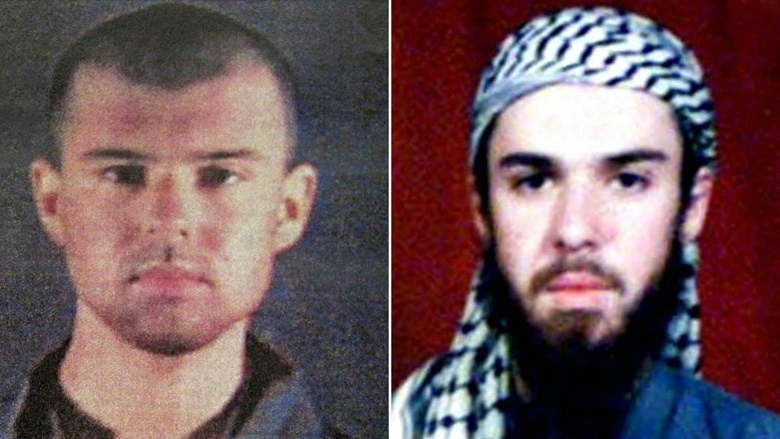
Left: a police file photo made available February 6, 2002. Right: a February 11, 2002 photograph of him as seen from the records of the Arabia Hassani Kalan Surani Bannu madrassa (religious school) in Pakistan's northwestern city of Bannu. (Photo by Tariq Mahmood/AFP/Getty Images)
John Walker Lindh, the “American Taliban” captured in Afghanistan in 2001, has been released from prison. Despite obtaining Irish citizenship while incarcerated, Lindh will not be allowed to move to Ireland under the terms of his release.
Lindh has served 17 years of a 20-year sentence. He pled guilty in 2002 to charges related to his involvement with the Taliban and al Qaeda in Afghanistan and Pakistan. He is being released from his sentence early for good behavior.
Lindh is currently under probation for three years, which will prevent him from moving to Ireland. CNN reports that Lindh is prohibited from communicating online in “any language other than English,” and that any electronic devices he owns will be monitored. Lindh is also barred from leaving the country during his probation.
Here’s what you need to know:
Lindh Obtained Irish Citizenship While He Was in Prison
Irish Times reports that Lindh received his Irish citizenship in 2013 while he was in prison. He was able to get dual citizenship because his paternal grandmother was born in Donegal. However, even with his Irish citizenship in hand, the Irish government could still deny Lindh a passport if they considered him a threat to national security. In a leaked email obtained by Foreign Policy magazine Lindh wrote, “Regarding the Ireland issue, I really don’t know what to expect from the Irish government.”
He continued, “I think the only reasonable way to present my case to them is to explain my unique circumstances in the U.S. practically impossible. Essentially I am seeking asylum from one country where I am a citizen in another country where I am also a citizen.”
Lindh’s father wrote an email to the prisoner explaining that he could arrange talks with the Irish government, but Lindh would need to repair his relationship with his lawyer, which would likely entail him being, “willing to condemn in all sincerity, publicly if needed, and without any reservation whatsoever, depravity of any kind, whoever commits it.” Lindh’s lawyer had dropped his case after Lindh made statements in support of ISIS.
Lindh replied that he was not willing to renounce his beliefs or issue condemnations to appease his lawyer. The conversation then turned toward the possibility of seeking asylum in Puerto Rico.
Leaked Documents and Correspondance With Lindh Indicate That He Still Holds Extremist Beliefs
An NBC Los Angeles producer who carried on a correspondence with Lindh while he was behind bars has released portions of the letters that raise concerns over Lindh’s release. Lindh’s letters were written by hand and had all been subject to inspection before being sent from prison.
Lindh wrote in a March 2014 letter, “I feel honored to have been able to take part in the Afghan Jihad and to contribute to the defense of the Islamic Emirate of Afghanistan, albeit only in a very limited capacity.
In a February 2015 letter, Lindh expressed continuing support for ISIS. In response to being asked if the extremist group represented him, he wrote, “Yes, and they are doing a spectacular job. The Islamic State is clearly very sincere and serious about fulfilling the long-neglected religious obligation of establishing a caliphate through armed struggle, which is the only correct method.”
At that time, ISIS had just released videos in which the organization beheaded Americans, including the journalist James Foley.
Foreign Policy magazine leaked a memo from The National Counterterrorism Center written in January 2017 that highlighted concerns over recidivism in violent extremists in general. The memo begins, “We assess that some of the more than 90 homegrown violent extremists (HVEs) incarcerated in the U.S. who are due to be released in the next five years will probably reengage in terrorist activity, possibly including attack plotting, because they either remain radicalized or are susceptible to re-radicalization.”
However, in a 2002 statement in his trial, Lindh said, “I have never understood jihad to mean anti-Americanism or terrorism. I condemn terrorism on every level, unequivocally.” In a 2011 piece in the New York Times, Lindh’s father characterized him as a young man trying to fight injustice. “His decision was rash and blindly idealistic, but not sinister or traitorous.” He wrote.
Lindh was 20 years old at the time of his arrest. He is now 38. His plans following his release are not yet known.